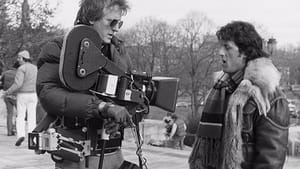Stay in the Loop
BSR publishes on a weekly schedule, with an email newsletter every Wednesday and Thursday morning. There’s no paywall, and subscribing is always free.
A tale of two statues
As the Rizzo statue goes down, ‘40 Years of Rocky’ reflects on Philly’s past

Is there anything left to say about Rocky that hasn't already been said? A short documentary called 40 Years of Rocky: The Birth of a Classic, now available to stream, lets fans see for themselves.
Directed by Derek Wayne Johnson, the 30-minute film features Sylvester Stallone telling the story of how he conceived of the movie, wrote and starred in it, and saw it become a cultural phenomenon. The film makes fine use of archival footage, including "home movies" from the set. The doc follows the production of the film, with a brief epilogue showing the film's premiere, and then the moment when it won the Oscar for Best Picture.
Fun for fans
Sure, none of this will be the slightest bit new to anyone with even a passing familiarity with Rocky, how it was made, or the backstory of its production. The title, 40 Years of Rocky, is somewhat misleading: the 1976 film actually came out 44 years ago. But it's fun to watch the footage and hear the stories, even if we've heard most of them before.
A fine feature documentary could be made about the entire Rocky series, and how each film is grounded in its own time: the original in the malaise of the mid-70s; the third and fourth, firmly in the Reagan era; and of course Creed bringing the whole Rocky mythology, brilliantly, into the 21st century. That’s not a word you could apply to the new short, but it's well done, for what it is.
Rocky and Rizzo
40 Years of Rocky, which debuted on June 9, arrived amid the protests that surged in Philly and around the country following the killing of George Floyd—protests that drove the long-awaited removal of the Frank Rizzo statue across from City Hall, and the Rizzo mural in the Italian Market. In watching the film, I couldn't help but notice the contrast between the Philadelphia of Rocky—which put forward a happy, positive, and aspirational version of what the city could accomplish during the Rizzo era—and the way things really were in the Philly of the '70s (and still are for those who idealize that time).
Rocky and Rizzo statues were, at least until recently, the city's two most famous likenesses. There are, of course, significant differences between the two men: one being fictional and the other not, one being considerably more divisive than the other.
Another is this: Rocky, for the past four decades, has always been with us. There have been endless sequels and spinoffs, books about the movies and the steps, and now this new documentary. Stallone comes to town frequently, and anytime he has, say, an opinion to share about the Eagles, it's dutifully written up by every local media outlet.
Rizzo, on the other hand, saw the end of his mayoral term 40 years ago and died in 1991. However, recent weeks have given us a clear look at the open racism, violence, and nostalgia for an imagined glorious past that was, in reality, a living nightmare for marginalized Philadelphians.
Rizzo’s idea
Even with Rizzo gone for decades, his statue removed and his mural painted over, his idea remains alive and well in Philadelphia. And that's an idea of white supremacy, hatred for the LGBTQ community, and overt police brutality: “the toughest cops in the world,” as Rizzo himself described them. For many, many people in our city, policing means what it meant in the Rizzo era: beating the crap out of marginalized people in order to, in the words of his proponents' favorite cliché, "make the streets safe."
In recent weeks, right here in Philadelphia, we've seen gangs of weapon-wielding white vigilantes menacing and assaulting people, including journalists, in both Fishtown and South Philly, with the apparent open assent of police. We've seen gleeful defenses of caught-on-camera police brutality, including the local police union actually selling T-shirts with an accused officer's name.
Rocky reborn
I wouldn’t be the first to point out that the racial politics of the first Rocky film are less than great, with the audience rooting for an average Joe (read: white guy) going toe-to-toe with the dominant Black heavyweight champion.
But the Rocky series, five years ago, begat Ryan Coogler's amazing Creed, a Black filmmaker's adaptation of the Rocky mythology into a completely different kind of great movie. It’s about not only a young Black man's struggle to come to terms with the legacy of the famous father he never knew, but also a very different Philadelphia than the ones in the previous movies, with very different music in the montage.
That represents the Philadelphia of today, and of the future. Rizzo nostalgia, Fishtown bat dads, and "Bologna Strong" t-shirts represent a regressive, violent, and ugly past. It’s now up to Philadelphia to decide which of those cities it wants to be.
What, When, Where
40 Years of Rocky: The Birth of a Classic. Directed by Derek Wayne Johnson. Available now via Video on Demand and Amazon.
Sign up for our newsletter
All of the week's new articles, all in one place. Sign up for the free weekly BSR newsletters, and don't miss a conversation.

 Stephen Silver
Stephen Silver